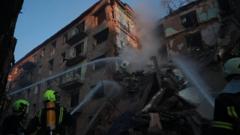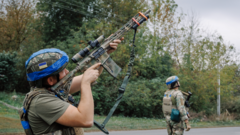This article examines the potential implications of the NATO summit in the Netherlands, especially regarding US-European relations, military spending commitments, and the ongoing threat posed by Russia and China.
**Significance of the NATO Summit Amid Rising Global Tensions**

**Significance of the NATO Summit Amid Rising Global Tensions**
Evaluation of the upcoming NATO summit's importance in light of recent US-Iran tensions and Trump's leadership.
In the wake of escalating tensions following recent US military actions in Iran, the upcoming NATO summit in the Netherlands is poised to be a pivotal moment for the alliance. Scheduled for Tuesday and marking President Trump's first NATO meeting since his re-election, the summit's outcome holds significance for both transatlantic relations and military commitments.
Historically, Trump's relationship with NATO has been fraught, characterized by accusations that European allies are not financially contributing their fair share to collective defense. While European nations are eager to mitigate these tensions, they also aim to convince Trump to reaffirm the US's military presence on the continent. “Relations have soured,” noted one diplomat, emphasizing the potential diplomatic disaster if Trump were absent from the summit amid ongoing scrutiny from Russia and China.
The summit's structure has been finely crafted by NATO Secretary General Mark Rutte to accommodate Trump, focusing on increasing defense expenditures. The hope is that by agreeing to Trump’s demands for heightened military spending, European allies can demonstrate their seriousness about defense while avoiding contentious debates that could trigger Trump’s ire. However, this commitment to a five percent GDP defense spending target is already causing discontent among member states, particularly Spain, which has reportedly negotiated an opt-out.
Many European leaders reflect a sense of urgency, amplified by recent aggressive posturing from Russia. Yet their trust in the US's protective role has diminished due to Trump’s mixed messaging regarding US military commitments abroad. While the US ambassador to NATO claims this summit is about credibility, uncertainties loom around potential declarations identifying Russia as a principal threat.
Europe has long depended on US military support for various capabilities, but a noticeable shift is underway. European governments are now recognizing the necessity of enhancing their defense infrastructure and capability independence. Despite significant military investments, there remains skepticism regarding whether these efforts can meet immediate security threats, especially with predictions that Russia could target NATO nations within five years.
Especially striking is Poland’s role, which, unlike Spain, is ramping up military expenditures as a means of bolstering its defense along the eastern front. Contrastingly, discussions in nations farther removed from Russia are complicated by political influences, particularly for Spain, where disagreements on military spending could have domestic ramifications.
As these discussions unfold, Europe must consider not only how much is spent but also where and how the money is allocated. With an alarming number of duplicative defense capabilities across the continent, the efficiency of military investments could be a significant topic overshadowed by the summit's more immediate discussions.
Ultimately, the upcoming meeting may be defined by Trump's rhetoric and decisions on the international stage. With the stakes so high, the potential for historical shifts in defense responsibilities is evident, possibly marking this summit as a defining moment for NATO since the Cold War and influencing future transatlantic dynamics.
Historically, Trump's relationship with NATO has been fraught, characterized by accusations that European allies are not financially contributing their fair share to collective defense. While European nations are eager to mitigate these tensions, they also aim to convince Trump to reaffirm the US's military presence on the continent. “Relations have soured,” noted one diplomat, emphasizing the potential diplomatic disaster if Trump were absent from the summit amid ongoing scrutiny from Russia and China.
The summit's structure has been finely crafted by NATO Secretary General Mark Rutte to accommodate Trump, focusing on increasing defense expenditures. The hope is that by agreeing to Trump’s demands for heightened military spending, European allies can demonstrate their seriousness about defense while avoiding contentious debates that could trigger Trump’s ire. However, this commitment to a five percent GDP defense spending target is already causing discontent among member states, particularly Spain, which has reportedly negotiated an opt-out.
Many European leaders reflect a sense of urgency, amplified by recent aggressive posturing from Russia. Yet their trust in the US's protective role has diminished due to Trump’s mixed messaging regarding US military commitments abroad. While the US ambassador to NATO claims this summit is about credibility, uncertainties loom around potential declarations identifying Russia as a principal threat.
Europe has long depended on US military support for various capabilities, but a noticeable shift is underway. European governments are now recognizing the necessity of enhancing their defense infrastructure and capability independence. Despite significant military investments, there remains skepticism regarding whether these efforts can meet immediate security threats, especially with predictions that Russia could target NATO nations within five years.
Especially striking is Poland’s role, which, unlike Spain, is ramping up military expenditures as a means of bolstering its defense along the eastern front. Contrastingly, discussions in nations farther removed from Russia are complicated by political influences, particularly for Spain, where disagreements on military spending could have domestic ramifications.
As these discussions unfold, Europe must consider not only how much is spent but also where and how the money is allocated. With an alarming number of duplicative defense capabilities across the continent, the efficiency of military investments could be a significant topic overshadowed by the summit's more immediate discussions.
Ultimately, the upcoming meeting may be defined by Trump's rhetoric and decisions on the international stage. With the stakes so high, the potential for historical shifts in defense responsibilities is evident, possibly marking this summit as a defining moment for NATO since the Cold War and influencing future transatlantic dynamics.























